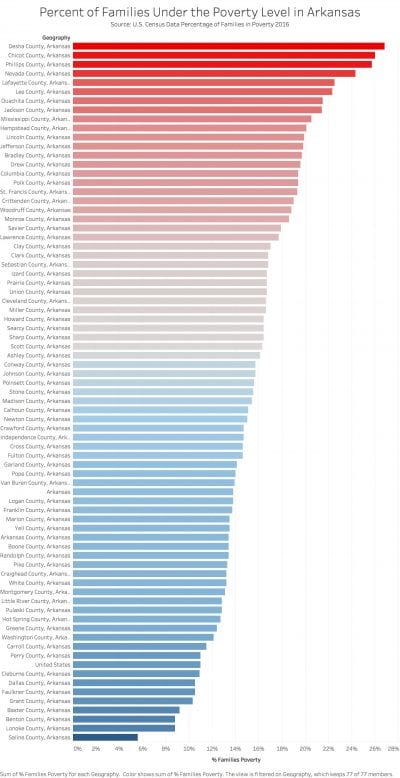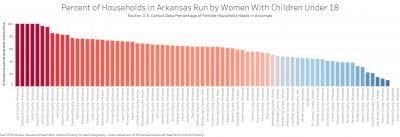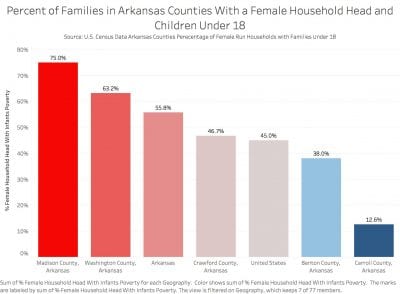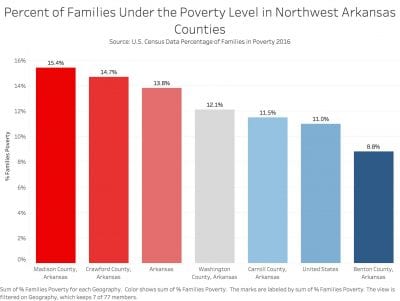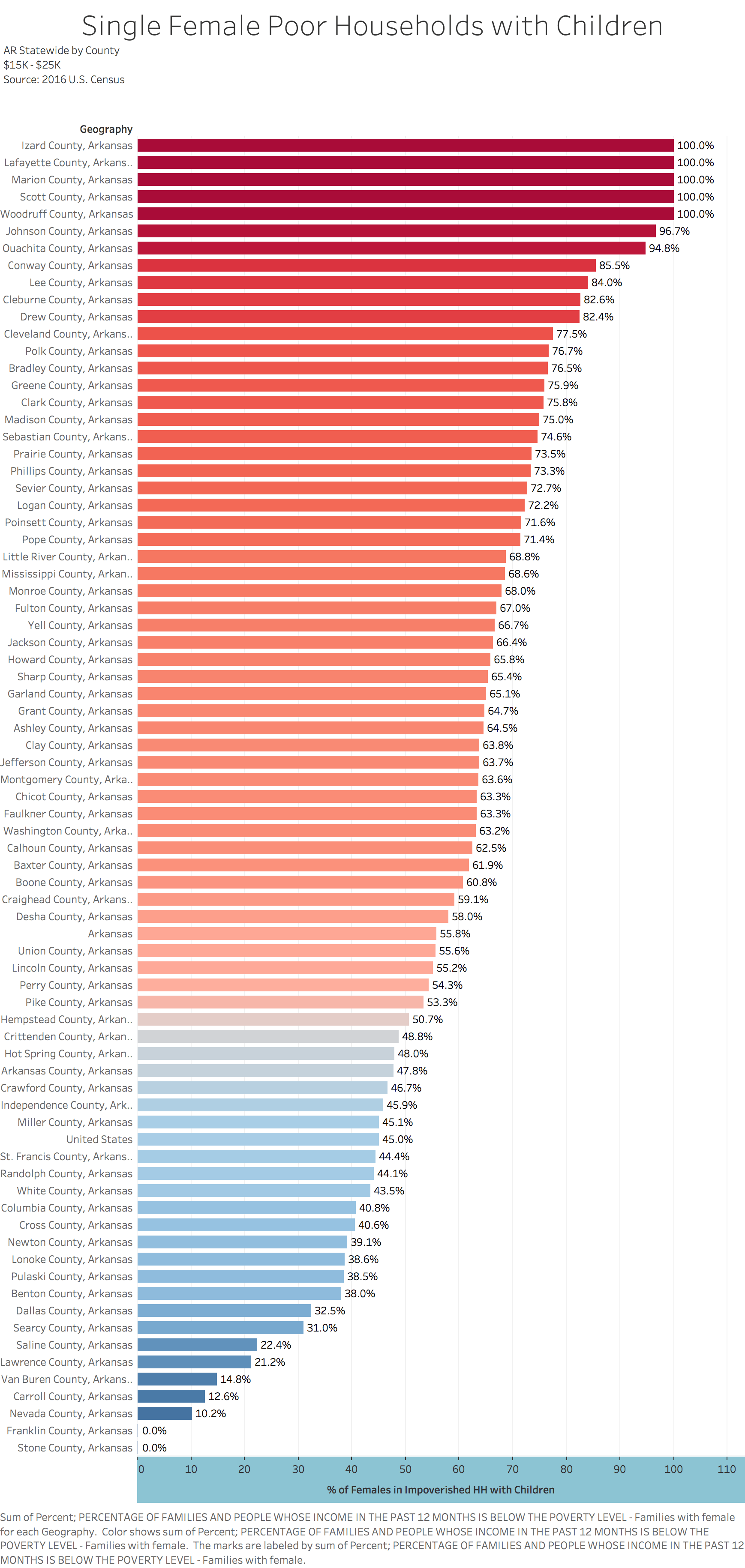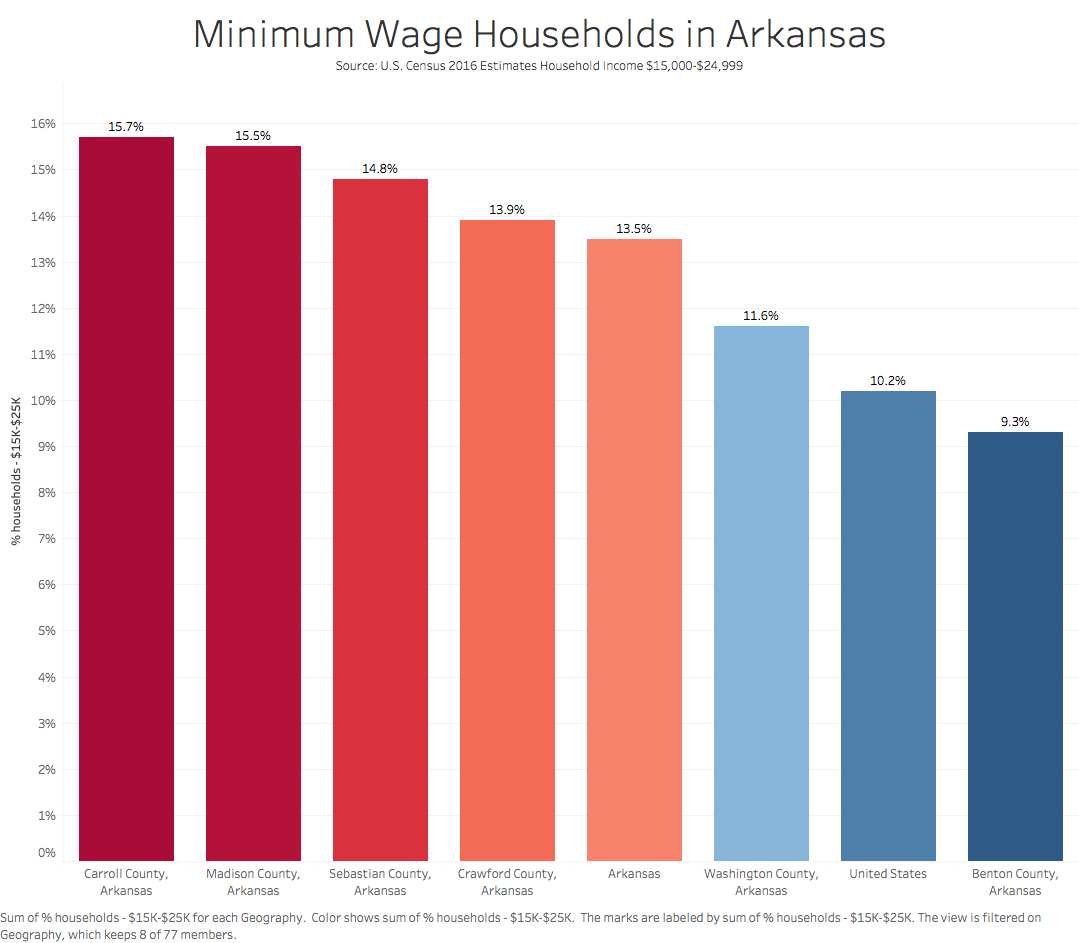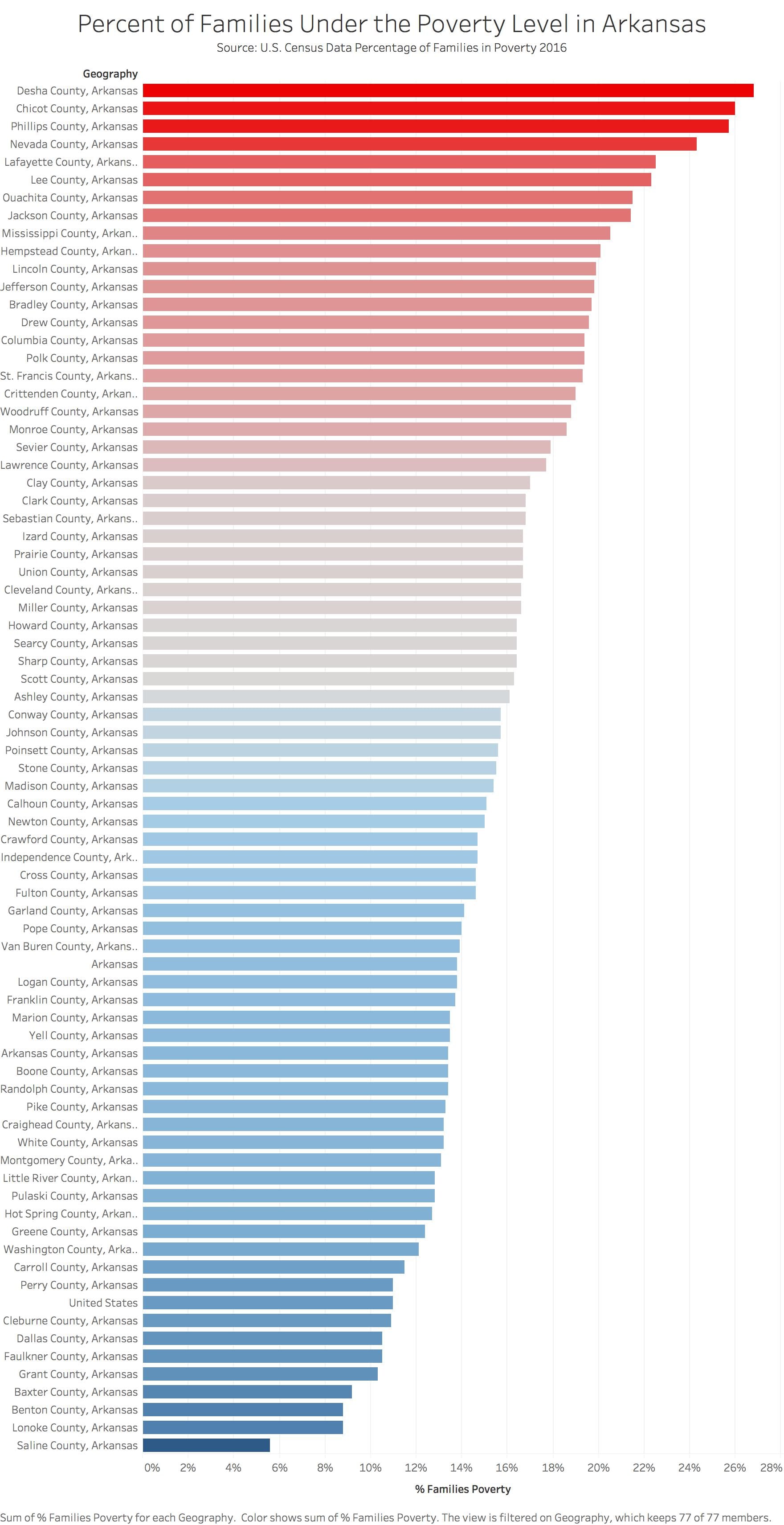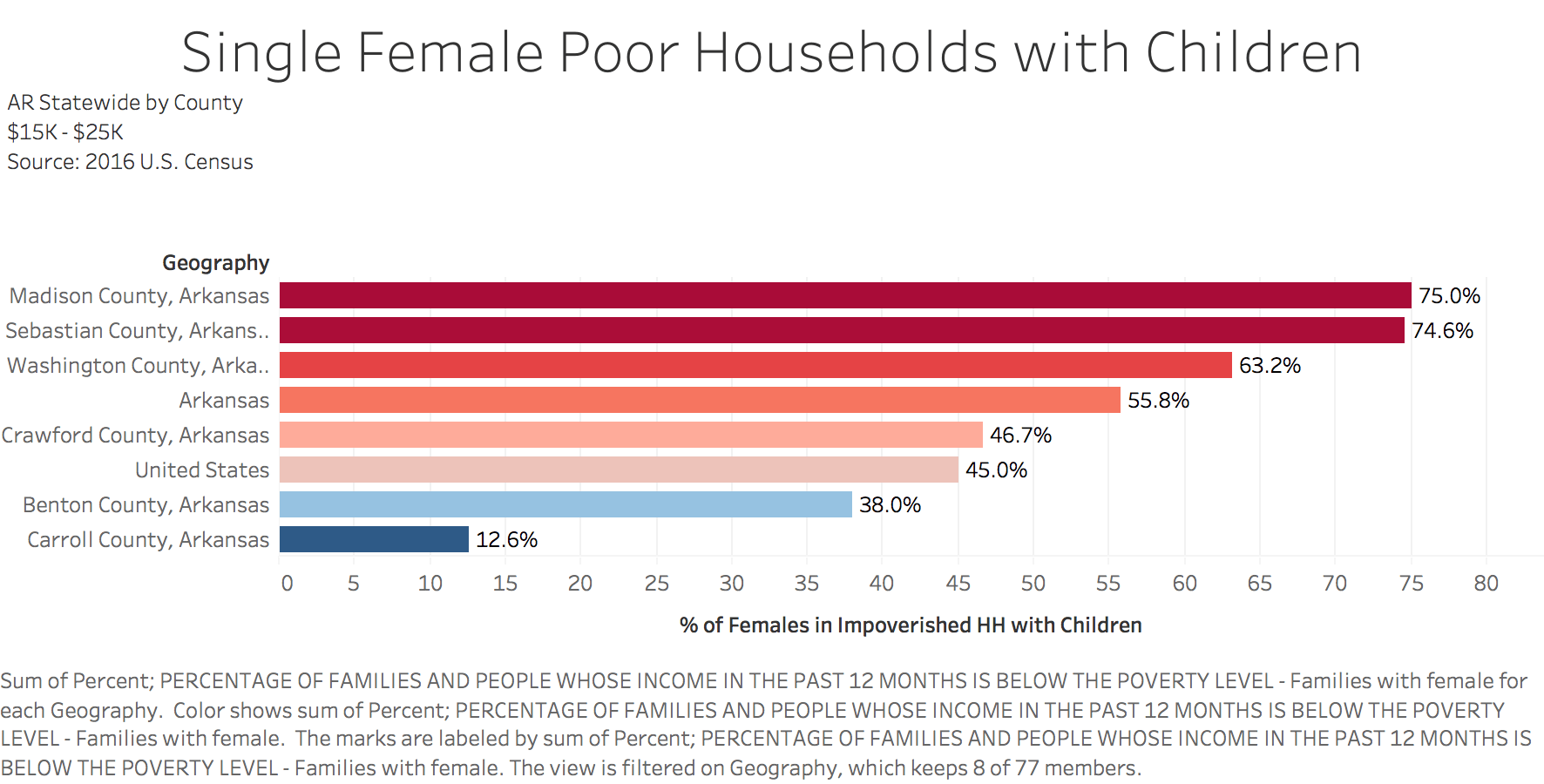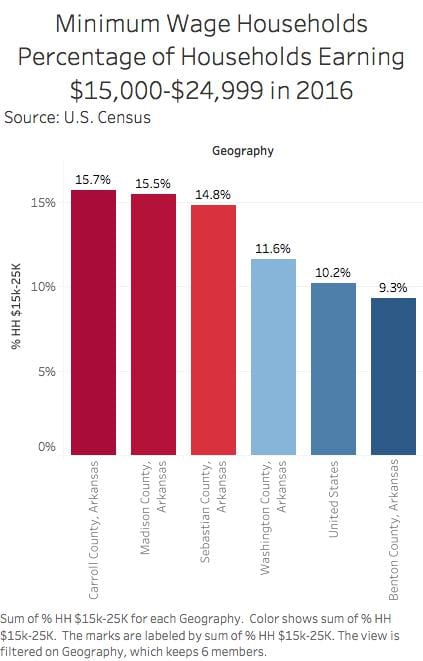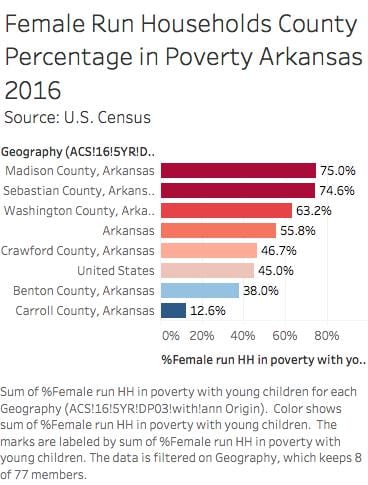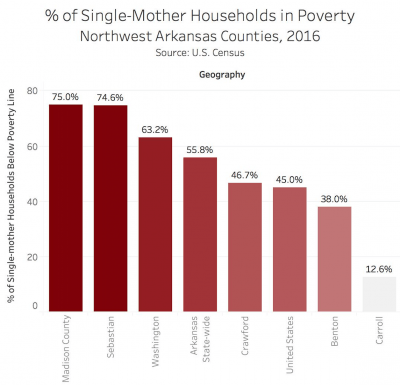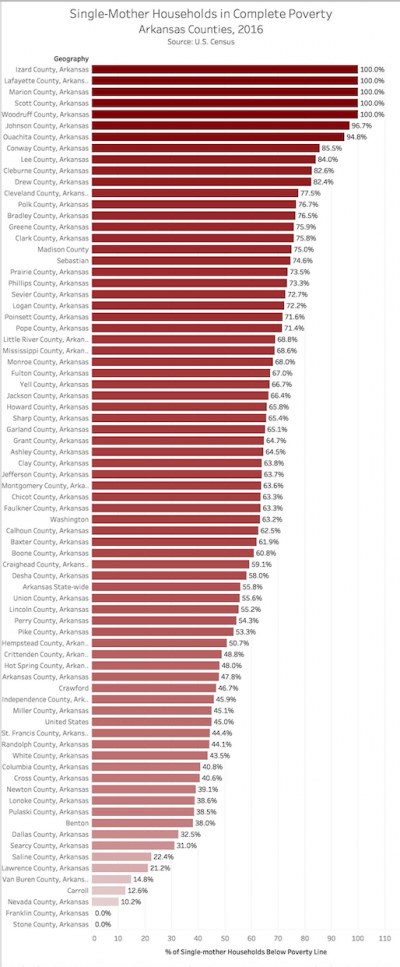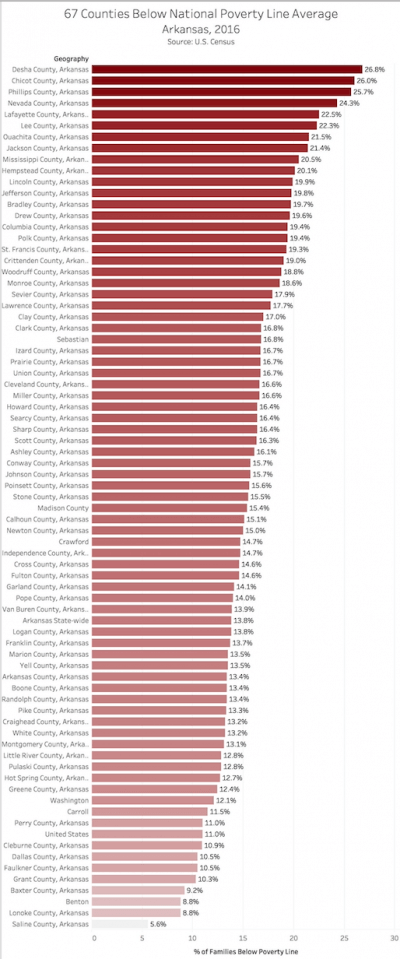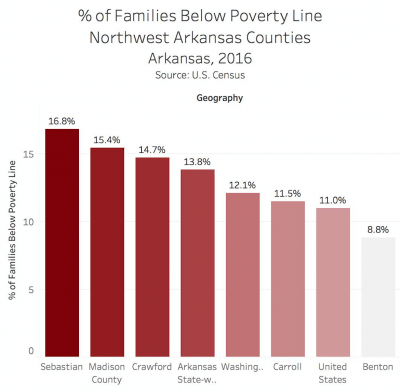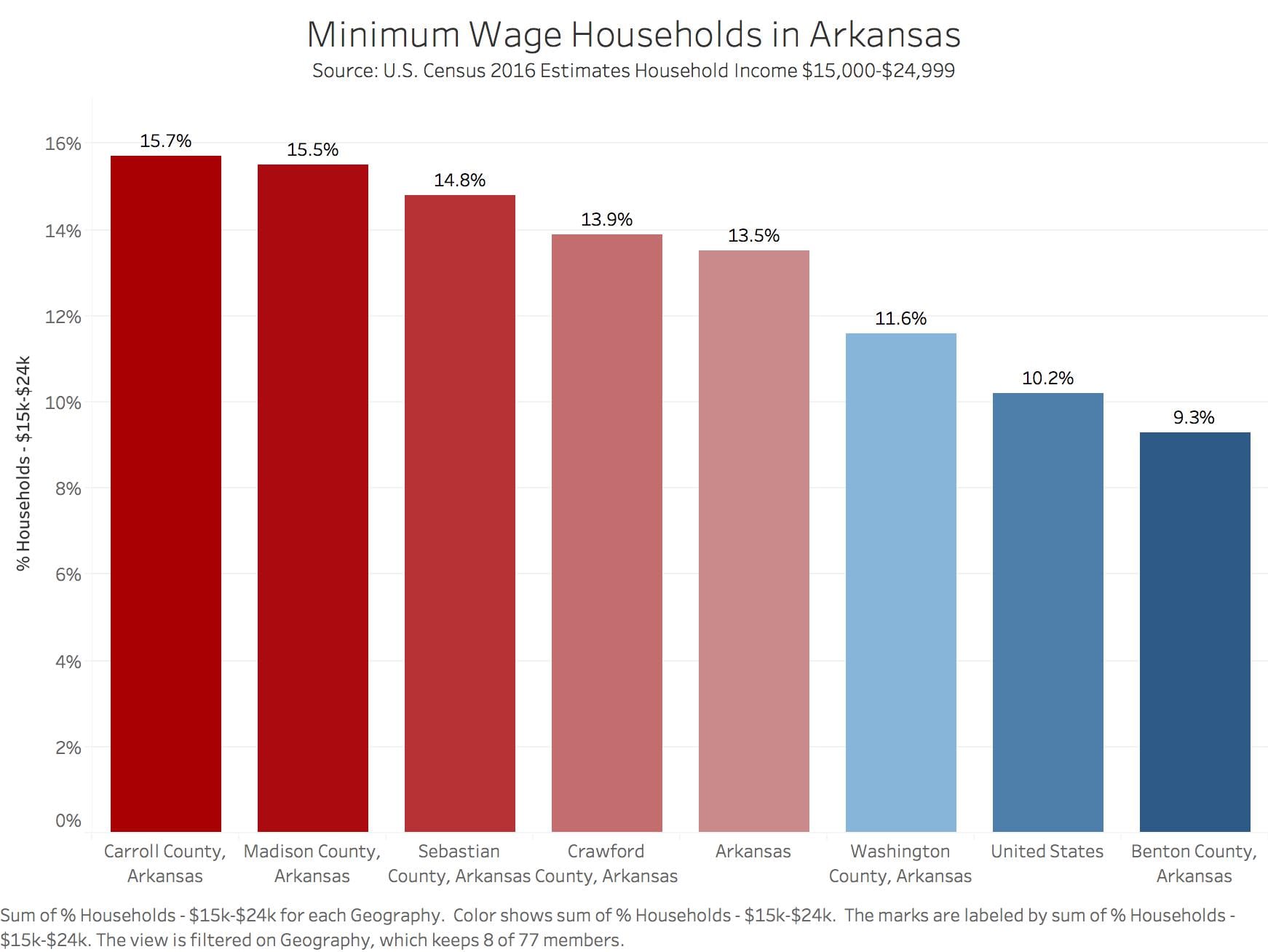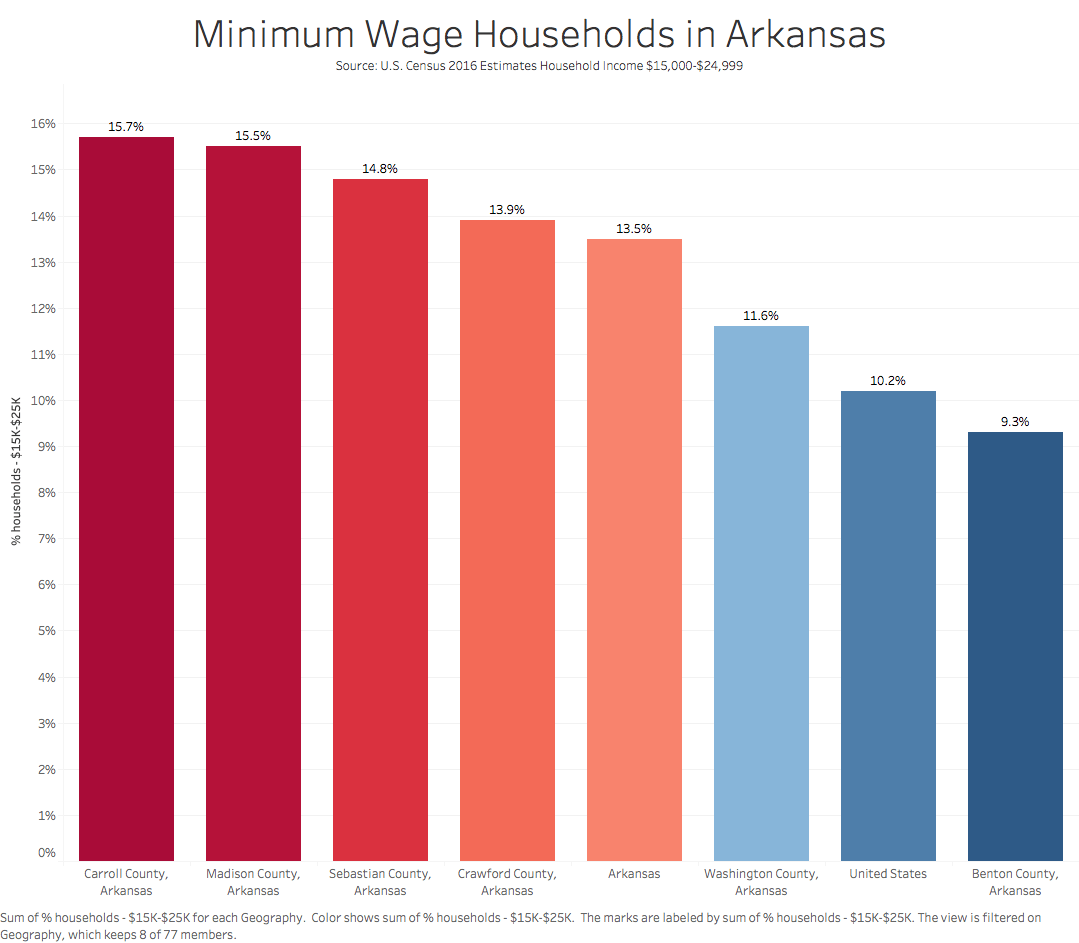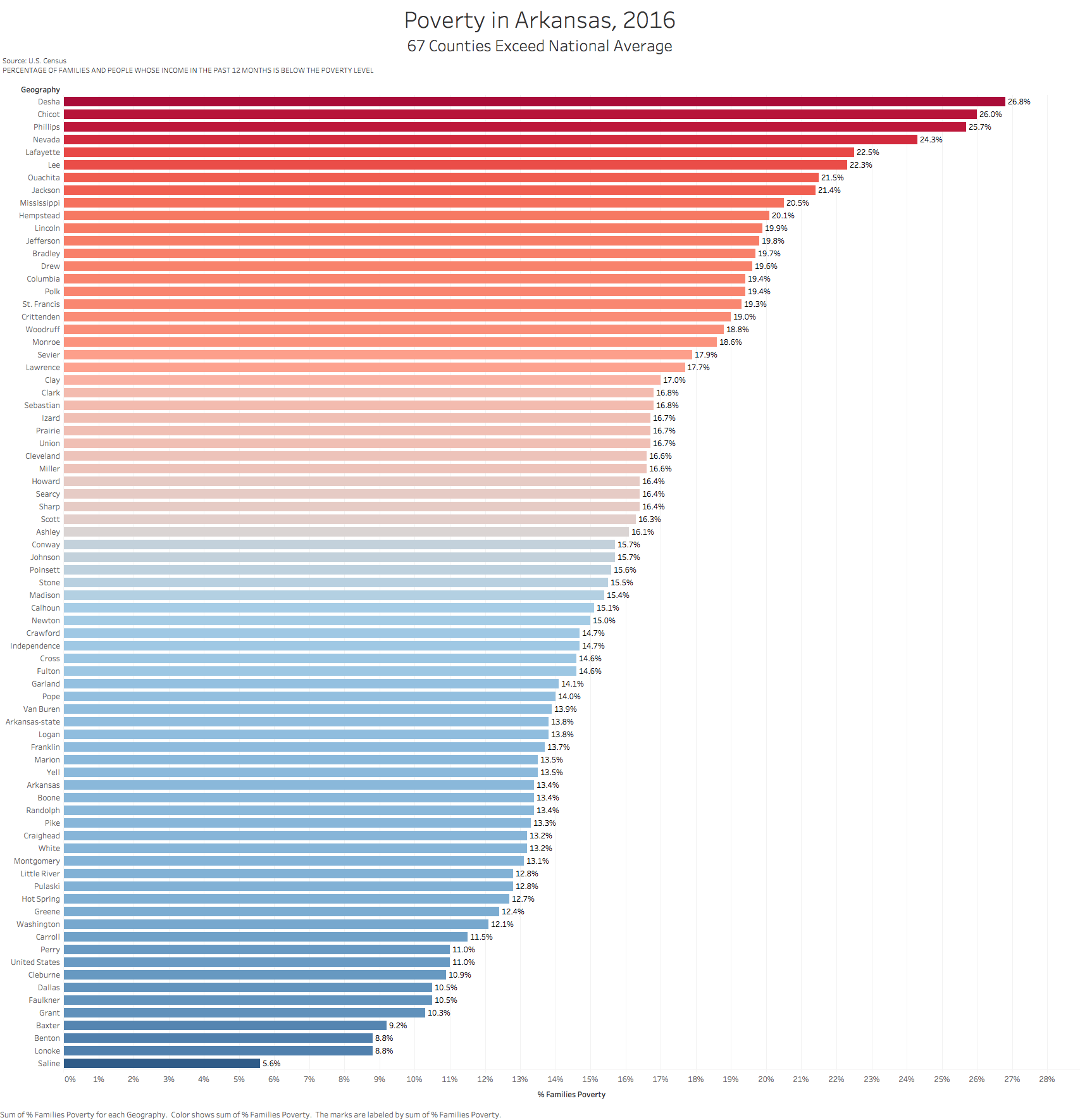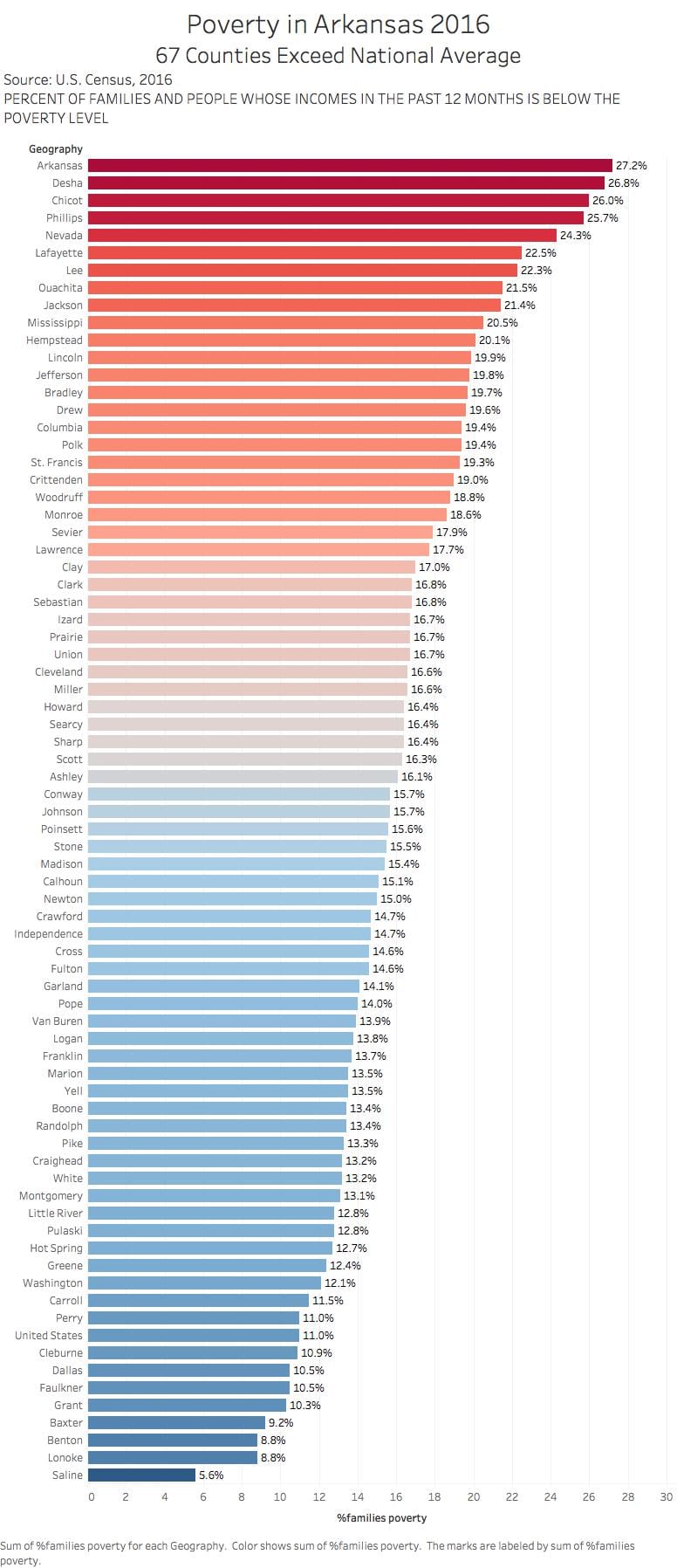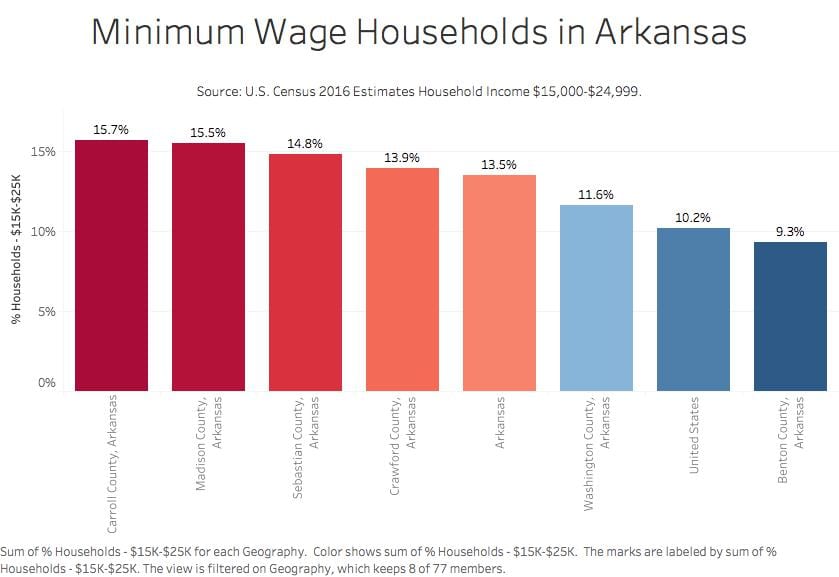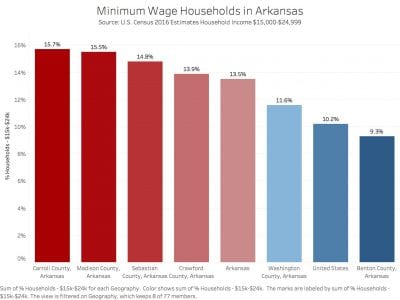Agenda for Monday, Oct. 8
–Context!
–Common Errors
Context #1
Add the Quick Facts for city population, demographics.
Little Rock: African American comprise 42 percent of Little Rock’s population. https://www.census.gov/quickfacts/fact/table/littlerockcityarkansas,US/PST045217
Add typical salary from Occupational Employment Statistics database for Arkansas
https://www.bls.gov/oes/current/oes_ar.htm
Common Errors – Math
Percent vs Percentage Point
At Lyon College, 67 percent of non-first-generation students paid back their loans within five years, while only 53 percent of first-generation students did the same, which results in a 14 percent POINT difference. The median debt for both types of students was the same though, at $12,000.
You mean “percentage point.” 14 percent of 67 is 9.4.
Steve Doig – MathCrib-Doig
Common Errors – AP Style on Numbers
AP Style on Numerals:
Numerals – AP Stylebook-2avrxtn
Common Error – Divi Library
Divi Builder. Do Not Save to Library.
Context #2: Build Charts for Context
First row: The overall median debt for Arkansas students; for men, for women.
Second row: The overall median debt for first generation students. And non-first generation
Third row: The overall statewide repayment rate, and the rate for men, for women
Fourth row: The overall median debt for white, black, asian, hispanic
Post on WordPress with the category Context
Research – Data Question
The Financial Aid department does not report loan repayment info to the Department of Education. “Once the students leave us we don’t track their information anymore,” he said.
Question: Look at data dictionary for source of this information. All 1,826 columns explained here.
https://collegescorecard.ed.gov/assets/FullDataDocumentation.pdf
https://collegescorecard.ed.gov/assets/CollegeScorecardDataDictionary.xlsx
Homework
#1: Read this report and compare to your work on context. Prepare to discuss it Wednesday
https://ticas.org/sites/default/files/pub_files/classof2016.pdf
#2: By 11:59 p.m. Tuesday, fix the issues with your charts and stories from Assignment #2. Post on WordPress, use the Context category for a tag
Mary Kerr Winters – Blog Post 3
2 Questions from New Precision Journalism:
- “In a simpler world, journalism programs that ignored journalism might have been justified. In the information society, the needs are more complex.” (Ch. 1) If the modern “news” stories that we publish today are not technically “news” because they are considered self-interest and politically bias then how are we to find stories that are interesting and exciting to our readers?
- What makes up a “base” when comparing percentages? This part confused me in chapter 2.
What I liked about New Precision Journalism:
- I did like how it clearly shows how to complete all of the equations and it clearly explains how journalism has radically changed over the years.
Class Matters:
- Yes I do buy the NY Times argument about the importance of class in the modern debate about income inequality because it is prevalent into today’s society the divide between social classes.
Interviews: (have not constructed an interview with them yet, however, we had a long conversation that looks like its on the road to an interview)
- Fide- C.C. Cleaning Services at Kappa Kappa Gamma
- We did not discuss much, however, our conversation was entirely in Spanish.
- They speak little English
- Believes no one wants to talk to them in Kappa so they just don’t try, but the second I started talking to her in Spanish she could not stop!
- Says they work very hard and it is difficult for her daughter at FHS to get scholarships to come to college next year.
- From Mexico
- Imarble
Minimum Wage, Statewide Poverty, and Single Female Impoverished Households Data:
Aubry Tucker: Blog Post 3
New Precision Journalism questions…
- I understand the rule of innocence to an extent especially with the example provided, but the rule of passivity is a new concept to me, I am wondering how any reader would be happy with research that a journalist takes at face value, and doesn’t do their side of the job in vetting the information or backing it up with their own research. My question is how is this such a strong pillar of journalism, and how have I not heard of it? Which leads me more so to ask how can a modern journalist remain objective? Is it impossible? Is looking into information considered me pushing my viewpoints?
- At some point will we stop trying to teach journalists to condense their facts and teach children how to read and appreciate news? I really love this quote, “Fact-finding ability is, after all, the source of what power we possess.”
Class Matters…
I definitely buy the NY Times argument about the importance of class in the modern debate about income inequality.
Interview…
I have an interview subject but I haven’t been able to meet with her. I used to work with her at a day care. I know she lost this job and accepted unemployment for some time, then got a new job that she had to leave and was on the hunt for a new one for some time. Recently she told me she is not only searching for employment but is also pregnant with twins with an uninvolved father. She just got a new childcare job at $9.50/hr. I know it’s really difficult to survive on these wages because when we worked together I was making actual minimum wage while she made a bit more for her time with the establishment and for having 2 degrees in early child care. I think she would be a really interesting subject for me to interview given her situation at the moment, but I’m not sure if it’s unethical considering I know her fairly well and consider her a friend. Either way, I think a woman working in childcare is a good route to go especially speaking from experience in what I was paid as a full time minimum wage worker. I worked with 2-year olds 5 days a week sometimes more than 40 hours a week making $8.50 an hour. Imagine that you have a classroom of about 15 two year olds between you and 2 other teachers. We split up bathroom time and no joke those kiddos have to go basically after every activity we do, and there are accidents, and of course diaper changes. So I have 5 kids that may all have poop in their pull-ups and it may take me about 30 min to get them all through and hands washed and tears wiped if that’s what a bathroom break comes to (which trust me often times it did.) What would you say if I asked you to change 5 dirty diapers of toddlers, be chipper about it, keep everyone clean and happy, and I’ll pay you $4.25 for your efforts? WOW I needed a raise.
Blogpost 2-6-18
Questions on “The New Precision Journalism”: 1.) Because a journalist can look at one statistic or piece of data and come up with a completely different outcome than another journalist, how can one do his or her best to analyze data in a way that reflects all sides of a certain topic? 2.) When adjusting for inflation, how often does the task need to be done, and how can one understand when and how it needs to be adjusted?
On “Class Matters”: I do agree with the New York Times’ argument about class in the modern debate about income inequality, for the most part. To be completely honest, I have never been incredibly interested or knowledgeable about math in general, let alone the math that is involved in economic structures. So, as a result, my opinion really means nothing at this point. Still, the way class is set up now is much different than it was years ago. My dad, a 76-year-old code enforcement officer, grew up in a time where the classes were extremely separated. His family was as poor as it could be, and my dad understood the importance of hard work. He built up enough money to move into what would formerly be called the “middle class”. Today, though the lines are blurred, the top of the food chain and the bottom of it are still polar opposites. The rich continue to get richer, while the poor do just the opposite. The middle, on the other hand, has split into many different sectors that can be classified by many factors other than simply money or material wealth. Still, I do agree that a person’s standing on the spectrum at birth determines at least a part of what his or her income will be later in life. At the same time, the American economic system is fluid to a point, so that same person could move up or down on the spectrum depending on connections, work ethic, and sheer luck.
Interview Subject:
Jenny Ridyard is a woman in her mid-50s who works at 7Hills Homeless Shelter in Fayetteville. Once homeless herself, Ridyard now works as one of the main data workers at the shelter. While her salary at 7Hills is not extravagant by any means, her husband’s disability checks and the family’s frugality has given them the opportunity to live relatively comfortably.
“All I need is a bed, clothes, car, food, and I’m good,” Ridyard said. “This shirt is two dollars, (these pants) are two dollars, these bracelets and everything are one dollar. I get everything from thrift stores.”
While Ridyard’s job description isn’t on the OES database, Community and Social Service Specialists make $27,980 a year in Arkansas. One could assume that’s about what Ridyard makes.
“People don’t need to get all the fancy stuff and the name brands,” Ridyard said. “Save, save, save. I’ve been on the other side where you don’t have anything at all. It changed my perspective, living out in the woods with nothing.”
Blog Post 3 Katie Serrano
- One topic I would like to discuss further in class from The New Precision Journalism is the term “passive innocent” and seeing journalism as a whole through the sense of a scientific method. I wouldn’t say I don’t understand it, but I do think it is something that could be debated and would like to talk about it. I understand the importance of remaining “objective” and see where the writer is coming from in the sense that journalism has to root from facts because if it doesn’t than it is fiction instead of news, but I don’t agree with turning it into a systematic formula. (I could also just be reading way too much into that paragraph.) On a more technical note, I seem to struggle with grasping the concept of percentages over 100, and percent increases over 1,000, etc. And although I previously stated my disagreement with making journalism scientific, I did like the comparisons the writer made regarding the similarities between the way journalists and scientists think. If there is one thing being a journalism major has made me, it is a skeptic.
- Yes. I believe that the concept of class, and the visual stereotypes and societal norms that go with it, are still so engraved in people’s minds that class and the income inequality debate go hand-in-hand.
- “A little over a month ago I got really drunk and lost my ID. I don’t have a car so it’s hard to go to the DMV to get a new one,” Hunter Smith, 22, said in response to asking why he works at the Taco Bell on Wedington Drive. “My mom works here too so it’s really the only place I can work for the time being.” Smith is saving up as much as he can so he can get a car, move out of his parents house, go back to school and finally get a “real job, maybe at IHOP or something,” he said. Smith, who only makes $8.50 an hour, considers his family to be in the lower-working class in Fayetteville, but he said that it didn’t use to be that way. “Ten years ago my mom was a nurse and my dad was a doctor, now we’re barely making ends meet.”
Butler Blog Post 3
- New Precision Journalism
- How does a journalist write effective stories on a topic that are unknown by the journalist, such as insurance or taxes, without sounding ignorant?
- How to “bargaining theory” and a “zero-sum game” work together to produce journalism?
- I really liked how it gave case studies that explained the various methods used and put them in journalistic reference along with realistic experiences.
- Class Matters
- I agree with the opinions of the NYT authors in that class maintains its importance in todays society. Class means more than just economic status, but rather represents a way of living. Class contains educational status, race, and social standing rather than just an income b racket; this keeps it relevant in discussions about income inequality.
- Interview
- Unfortunately due to scheduling conflicts I was unable to find a time to go to the Iron Skillet when a waitress would have time to sit and talk with me. I have it on my calendar to go Monday in the middle of the day to get the accurate amount of information.
